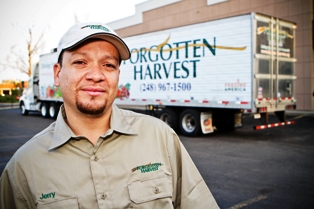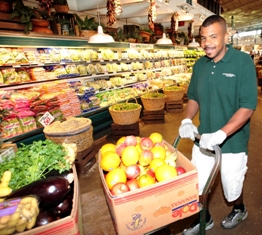Forgotten Harvest & WSU MBA Students: "Commitment to the Goal is the Most Important Element"
 Every day, the hunger pangs grow louder in Michigan. In the tri-county area over 500,000 people currently live in poverty. A consequence is a surge in the number of the “food –insecure,” a term used by the USDA, meaning people who have limited or uncertain availability to nutritionally adequate and safe foods.
Every day, the hunger pangs grow louder in Michigan. In the tri-county area over 500,000 people currently live in poverty. A consequence is a surge in the number of the “food –insecure,” a term used by the USDA, meaning people who have limited or uncertain availability to nutritionally adequate and safe foods.
Enter Paul Reagan, Ph.D., senior lecturer of management, at Wayne State’s School of Business Administration, who presented his MBA students with an opportunity to work with Forgotten Harvest, a non-profit organization that works to feed the hungry in metro Detroit.
“I decided I could use an initiative like this with so much meaning, to develop leaders in my Organizational Change and Development (MGT 7630) class. They would be learning in the field, taking them further toward developing as leaders and discovering that commitment to the goal is the most important element in a project,” explained Reagan.
Students committed to developing a new reporting system for Forgotten Harvest allowing donors to view their donations by category. “Once we figured out our project would be a reporting system – we really wanted to make sure we could train, implement and measure before the course ended,” explained Jeff Cahill, MBA ’11.
The seriousness of the project soon took hold. Reagan explained, “We looked at things from an organizational perspective, from a societal perspective. People were starving. It was about how many pounds of food could be rescued.”
Forgotten Harvest rescues food for the hungry from 450 donors including stores, restaurants and farms. In 2010, it distributed 23.3 million pounds food among 160 emergency food providers throughout the tri-county area. This year’s target is 29.6 million pounds.
The effect of the new reporting system was immediate. The students and Forgotten Harvest were quickly able to identify donations by category, which in turn allowed them to provide immediate updates to donors of their contributions. Subsequently, following a two-week test, store donations increased by 12 percent, four of the stores started donating in new categories, and 40 percent of stores increased donations by more than 25 percent. As a result, 4,930 more meals were donated to Forgotten Harvest.
test, store donations increased by 12 percent, four of the stores started donating in new categories, and 40 percent of stores increased donations by more than 25 percent. As a result, 4,930 more meals were donated to Forgotten Harvest.
Praising the WSU students, Marilyn Beckham, director of regional food for Forgotten Harvest said, “The beauty of working with Wayne State University students is their commitment and passion for the work that needed to be done. They really owned it and treated it just like a real business which is on-going and evolving.”
Kroger, a supporter of Forgotten Harvest, now supports continuing research by the business school and psychology department regarding donation decisions of their store managers. Reagan described the collaboration this way, “They view what we’re doing as an exam of a key process. Field research is so hard to do, and Kroger has opened their doors to us. They would like their efforts in the tri-county area to be a national best practice, and we’re going to try our best to help them do that.”
Commenting on the experience, Sarah Demery, MBA ‘11, said, “The prospect of Paul Reagan’s class was absolutely the highlight of my MBA experience. I have never learned so much from coursework simply by doing, and I’m very happy that I can still take part in this project (as an alumna) and remain involved on campus.”
Learn more about Forgotten Harvest here. Watch this video to learn more about the MBA students’ project.



